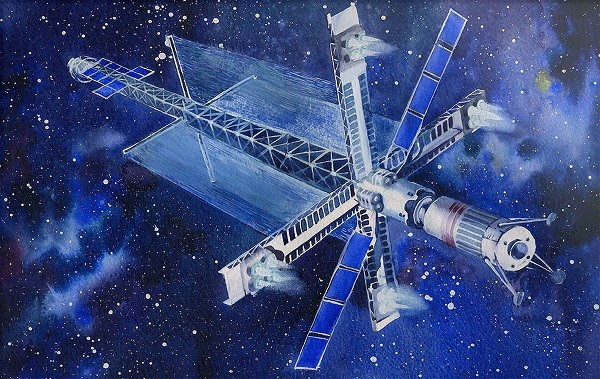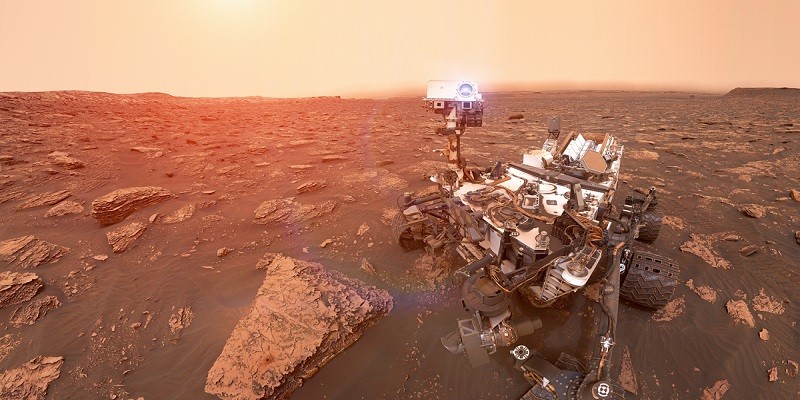The Race for Mars: Technology’s Role in Space Exploration And Colonization
Technology plays a crucial role in the race for Mars by enabling space exploration and colonization efforts. As humans continue to push the boundaries of our understanding and reach, advancements in technology are instrumental in overcoming the challenges of long-duration space travel, sustaining life on Mars, and building the necessary infrastructure for future missions.
From robotics and artificial intelligence to propulsion systems and life support technologies, innovative solutions are driving the progress of space exploration and paving the way for eventual human presence on the Red Planet. With the combined efforts of governments, private companies, and scientific communities, technology is propelling humanity closer to the realization of Mars colonization in the not-so-distant future.

Table of Contents
Importance Of Technology In Space Exploration
Space exploration and potential colonization of other planets, like Mars, are at the forefront of human achievement. Technology plays a pivotal role in advancing our capabilities to explore and inhabit the cosmos. From robotics to propulsion systems, the development of cutting-edge technologies is crucial in overcoming the challenges of space exploration and paving the way for sustainable human presence beyond Earth.
Advancements In Robotics
Robots have become indispensable for space exploration. Advancements in robotic technology enable the execution of complex tasks in extraterrestrial environments. These robots are capable of conducting repetitive tasks, gathering data, and even assisting human astronauts, thereby reducing human exposure to dangerous conditions.
Innovations In Propulsion Systems
Propulsion systems are the backbone of interplanetary travel. As we aim to reach Mars and beyond, innovations in propulsion systems are essential for achieving higher speeds, greater efficiency, and increased payload capacities. Breakthroughs in propulsion technologies hold the key to shortening travel times and making deep space exploration more feasible.
Challenges Of Colonizing Mars
Colonizing Mars is an exhilarating prospect, but it comes with its fair share of challenges. As humans set their sights on the Red Planet, they must confront a myriad of environmental factors and establish robust life support systems to ensure the survival of future Martian settlers. Let’s delve into the intricacies of these challenges and explore the technological advancements that will help pave the way for the colonization of Mars.
Environmental Factors
Mars poses a starkly different environment than Earth, where harsh conditions present considerable obstacles to colonization efforts. The frigid temperatures, averaging -80 degrees Fahrenheit, create a daunting hurdle for human habitation.
Furthermore, Mars has a thin atmosphere composed primarily of carbon dioxide. This atmosphere offers little protection from harmful radiation emitted by the sun, making it essential to develop innovative shielding technologies for astronauts and future colonists.
With the absence of a magnetosphere, like Earth’s, Mars is also susceptible to dangerous solar flares and cosmic rays. These high-energy particles can penetrate spacecraft, increasing the risk of radiation-induced health problems for humans. Overcoming these radiation challenges requires the development of advanced shielding materials and the establishment of protected habitats beneath the planet’s surface.
Life Support Systems
Surviving on Mars necessitates the creation of self-sustaining life support systems capable of providing astronauts with essential resources such as air, water, and food. Given the significant distances involved, relying on constant resupply missions from Earth is neither practical nor sustainable for long-term colonization.
One approach to addressing this challenge involves cultivating plants in controlled environments, such as greenhouses, to provide a renewable source of food and oxygen. These closed-loop systems recycle waste and harvest nutrients to sustain the growth of crops, ensuring a sustainable source of sustenance for future Martian settlers.
Moreover, technologies for extracting and purifying water from the planet’s subsurface ice deposits are crucial for supporting human life on Mars. Additionally, efficient air-recycling systems that remove carbon dioxide and replenish oxygen are vital to maintaining a breathable atmosphere within habitats.
Lastly, waste management and resource conservation will be paramount in a Martian settlement. Developing methods to reduce, reuse, and recycle materials will be essential for minimizing reliance on external resources and achieving long-term sustainability.
Technological Solutions For Martian Colonization
As humanity sets its sights on Mars for potential colonization, the development of innovative technological solutions is crucial for ensuring the success and sustainability of such a mission. From agricultural adaptations to water filtration methods, a wide range of technologies are being explored to overcome the unique challenges that Martian colonization presents. In this article, we will dive into two key areas of focus: Agricultural Adaptations and Water Filtration Methods.
Agricultural Adaptations
To sustain a growing population on Mars, it is essential to establish sustainable food production systems. However, the Martian environment poses significant challenges for traditional farming methods. With its thin atmosphere, extreme temperatures, and lack of natural sunlight, Martian soil is nutrient-poor and inhospitable to most plants. To overcome these obstacles, scientists and engineers have been working on developing innovative agricultural adaptations suitable for Martian conditions.
One such solution is hydroponics, a soil-less farming technique that involves growing plants in nutrient-rich water solutions. Hydroponics can be beneficial in Mars colonization due to its efficient use of water and space, making it ideal for resource-limited environments. By fine-tuning nutrient ratios and controlling environmental conditions, hydroponic systems enable the cultivation of a variety of crops, providing astronauts with a diverse and nutritious diet during their stay on Mars.
Besides hydroponics, aeroponics is another promising farming technique that could revolutionize Martian agriculture. Instead of using water as a medium, aeroponics involves growing plants in an air or mist environment, providing them with a fine spray of nutrients. This method not only conserves water but also minimizes the risk of soil contamination and allows for more efficient nutrient uptake by plants.
Water Filtration Methods
In any outpost on Mars, access to clean water is vital for sustaining life. However, the Red Planet’s limited water resources and the presence of perchlorates – harmful chemicals found in Martian soil – pose significant challenges for providing safe and potable water. Therefore, developing efficient water filtration methods is crucial for ensuring a consistent supply of clean water for astronauts.
One such method gaining traction is reverse osmosis, a process that uses a semipermeable membrane to remove impurities from water. By applying pressure, reverse osmosis effectively filters out contaminants, providing clean drinking water. While the development of compact and energy-efficient reverse osmosis systems suitable for Mars is still ongoing, this technology holds great promise for future Martian colonies.
Another innovative approach being explored for water filtration on Mars is using advanced oxidation processes (AOPs). AOPs involve the application of powerful oxidizing agents to degrade and remove pollutants from water. This method shows potential for efficiently removing perchlorates and other harmful substances from Martian water sources, making them safe for human consumption.
As we strive towards Martian colonization, technological advancements in agricultural adaptations and water filtration methods play a crucial role in ensuring the sustainability and self-sufficiency of future Martian colonies. Hydroponics and aeroponics offer efficient farming solutions, while reverse osmosis and advanced oxidation processes show significant promise in providing clean water. These technological solutions pave the way for a future where humans can not only survive but thrive on the Red Planet.
Impact Of Technology On The Future Of Space Travel
The future of space travel holds tremendous promise, largely due to rapid advancements in technology. From interplanetary communication to the possibilities of space tourism, modern technology is revolutionizing the way we approach space exploration and colonization. Let’s delve into the incredible impact of technology on the future of space travel.
Interplanetary Communication
Interplanetary communication is the linchpin of successful space travel. Advancements in communication technology have paved the way for real-time data exchange between Earth and distant celestial bodies, such as Mars. The development of space communication networks has enabled the seamless transfer of vital information, essential for the success of space missions. With technology, we are bridging the vast distances between planets, bringing us closer to the reality of interplanetary colonization.
Space Tourism Possibilities
The realm of space tourism is on the brink of realization, thanks to technological breakthroughs. Advancements in spacecraft design and propulsion systems have made the idea of commercial space travel a tangible possibility. With technology, we are not only exploring the cosmos but also opening the doors for civilians to venture beyond Earth’s atmosphere. The potential for space tourism presents a new frontier for the travel industry, sparking excitement and interest in the prospect of space exploration as a leisure activity.
Frequently Asked Questions
How Is Technology Advancing Mars Exploration?
Technology is enabling greater capabilities for exploration and research on Mars.
What Role Does Technology Play In Colonizing Mars?
Technology allows for sustainable habitats, resource utilization, and ensuring survival on Mars.
Why Is Mars Considered A Viable Option For Colonization?
Mars has resources, similarities to Earth, and the potential for long-term human settlement.
How Does Technology Overcome Challenges Of Mars Exploration?
Advanced technology assists in addressing obstacles such as harsh environments and communication delays.
What Innovations Are Driving The Race For Mars?
Innovations like robotics, AI, and sustainable systems are accelerating the progression to Mars.
Conclusion
With technology advancing rapidly, the race for Mars has become more feasible than ever. Space exploration and colonization are not just distant dreams but realistic possibilities. As we continue to push the boundaries of technological innovation, the future of humanity extending beyond Earth seems closer than ever before.

